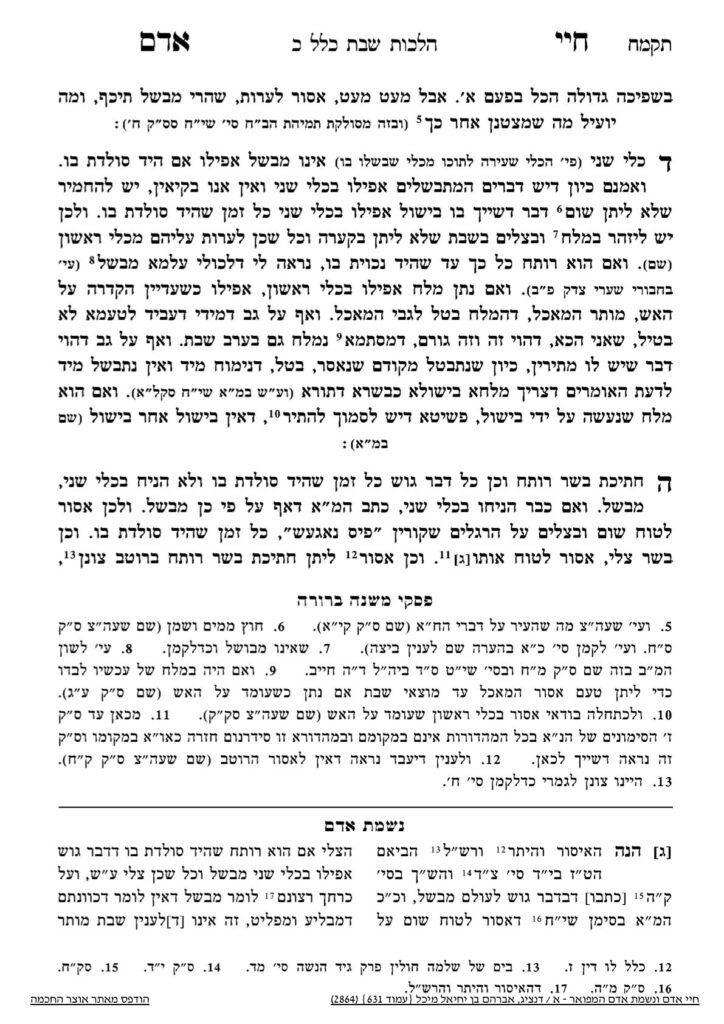We are continuing in siman 4, which discusses kli sheini.
The Chayei Adam writes that, in his opinion, even though kli sheini does perform bishul, if it is hot enough that it is yad nichveis bo, it will have the ability to cook. The Chayei Adam is clearly not referring to kalei habishul, because those cook at even lower temperatures. Practically, we are machmir to consider most foods kalei habishul, as we discussed yesterday. If so, even without the concern of yad nichvais bo, one may not place most items in a kli sheini.
This halacha is relevant to bishul achar bishul. We are machmir that once something which has liquid has cooled down completely, there is a concern of bishul achar bishul to put it back on a heat source. However, it is muttar to reheat it even if it is a davar lach (has liquid) in a kli sheini. But, if the kli sheini is yad nichveis bo, even if the food is already fully cooked, it will be assur to place the food in the kli sheini.
The idea that when extremely hot kli sheini will have the ability to cook is not mentioned by the rishonim in hilchos Shabbos. It may be mentioned in one case, of a bath in which one places a small amount of cold water into a large amount of hot water. The Chayei Adam himself brings the source for yad nichvais bo in a kli sheini from a Rambam in hilchos maaser. It is telling that the source is not mentioned anywhere in hilchos Shabbos. The Mishnah Berurah quotes the Chayei Adam as his source, and holds that one should be concerned that if kli sheini is extremely hot, it may have the ability to cook. However, the Chazon Ish writes that from the fact no earlier opinions mention this point, it must not be true. However, since it is a safeik deoraysa, he is not willing to be matir against the opinion of the Chayei Adam.
We have learned that we are concerned for kalei habishul in a kli sheini even at the lesser heat of yad soledes bo. The Chayei Adam wrote that since we are unsure whether most items qualify as kalei habishul, one should be machmir. The Mishnah Berurah follows the Chayei Adam. As we have learned, the Gemara gives examples of kalei habishul, and we extrapolate from there. The Chazon Ish disagrees, and writes that the items mentioned in the Gemara are specific items which are kalei habishul. One does not need to be concerned for any other items.
The Chayei Adam and Mishnah Berurah do not discuss the status of yad nichvais bo in a kli shlishi.
The Mishnah Berurah writes that even if one is machmir on kalei habishul in a kli sheini, they do not need to be machmir in a kli shlishi. The Chazon Ish takes issue with this point as well, and writes that if one is concerned for bishul in a kli sheini, they should be concerned for bishul in a kli shlishi as well. He writes that he, personally, disagrees with the Chayei Adam and Mishnah Berurah’s application of kalei habishul (because he holds it only applies to the specific items mentioned in the Gemara), but, according to their thought process, it should apply to a kli shlishi. But in regards to yad nichvais bo, the Mishnah Berurah does not discuss either way whether it applies or does not apply to a kli shlishi. We possibly may assume that it does not, as otherwise he would have mentioned it.
The minhag haolam is to follow the Mishnah Berurah in regards to kalei bishul, both to be concerned for most foods in a kli sheini, and not to be concerned for kli shlishi. Reb Moshe paskens this way as well.
To summarize:
We learned the concept of yad nichveis bo and how it is relevant to bishul achar bishul, in that even if an item has already been cooked and cooled down, it is assur to place it into a kli sheini which is yad nichvais bo.
We discussed whether kalei habishul is extended to most items (Chayei Adam and Mishnah Berurah) or limited to the items in the Gemara (Chazon Ish)
We discussed the status of kli shlishi for kalei habishul, where the Chayei Adam and Mishnah Berurah are matir, and the Chazon Ish is machmir.
We raised the question whether there is a concern of yad nichvais bo in kli shlishi. We may assume no, from the lack of mention in the Mishnah Berurah.



